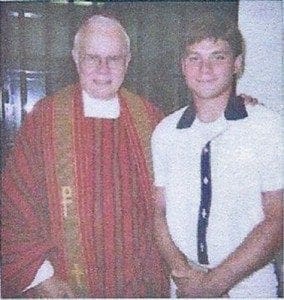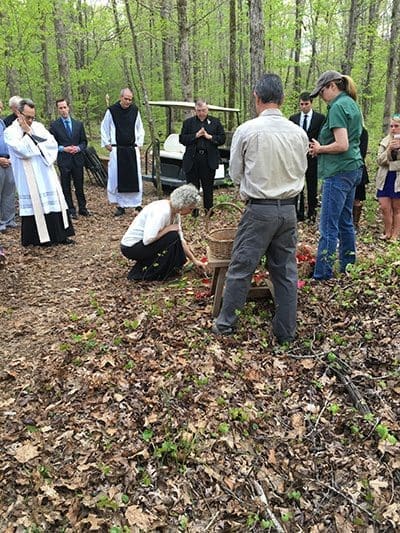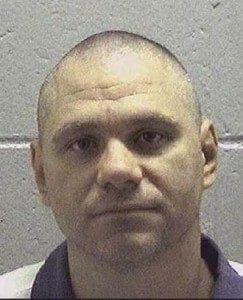Conyers
Joshua Bishop, executed March 31, was a ‘powerful witness for forgiveness’
By GRETCHEN KEISER, Staff Writer | Published April 14, 2016
CONYERS—Joshua Bishop, who died by lethal injection March 31, was remembered by his faith community, friends and supporters at a funeral Mass celebrated April 12 at St. Pius X Church in Conyers by Father Tom Zahuta.
Bishop, who became a Catholic in prison, regularly attended Mass and other faith gatherings. He met with visiting deacons in the Jackson prison, particularly Deacon Richard Tolcher and Deacon Norm Keller. He was 41.
Following the Mass, he was interred at Honey Creek Woodlands, at the Monastery of the Holy Spirit.
The night of the execution, a vigil was held on the grounds of the Georgia Diagnostic and Classification Prison. A group of 50 or more people, some coming from the Catholic Chancery in Smyrna, prayed and waited for the possibility that there would be a last-minute reprieve based on legal appeals. Those waiting included Bishop’s attorney and a corps of young law students, some wiping away tears, chaplains from several Christian denominations, others who visited Bishop, and those opposing the death penalty. Over several hours the group prayed Psalm 23 and the Our Father and sang “Amazing Grace.” The names of those who have been executed in Georgia were read aloud. People spoke about Bishop, who was quick to attend every religious service and friendly. He had developed a talent with art in prison.

Archbishop John F. Donoghue baptized Joshua Bishop into the Catholic faith on Oct. 6, 1999, at a Mass at the prison in Jackson. Bishop was executed by lethal injection March 31.
Bishop grew up fatherless in Milledgeville, witnessing the addiction of his mother and violent abuse taken out on her and he and his brother by her boyfriends. He tried to protect her. The boys were homeless or lived in foster homes. He had 16 different placements in 10 years. When he was 19, he was involved in the killing of Leverett Morrison, along with another defendant, over a car. His co-defendant, who allegedly struck the fatal blow to Morrison, received a life sentence with the possibility of parole. Bishop, who immediately confessed to that and the killing of one of his mother’s alleged abusers, received the death penalty.
While in prison for the next 22 years, he found stability, the care of others, role models and faith, his lawyer wrote.
“The person Josh Bishop has become bears little comparison to the teenager whose life was defined by the dismal circumstances in which he was born and raised; a teenager whose view of life was so contorted that he devalued life itself,” attorney Sarah Gerwig-Moore said in a plea for clemency before the state Board of Pardons and Paroles.
“In the Josh we now know, we see a kind human being of humility, compassion and gratitude. … He is a simple man of quiet and positive influence, and his life has touched others even since his imprisonment.”
“We plead to this Board for clemency,” she wrote. “The prolonging of his life would serve a far greater purpose than would the taking of it.”
His “is a life that can be held up to others as a living example of the extent to which lives in a state of loss and addiction can be transformed into ones of meaning, purpose and hope.”

(L-r), Father Tom Zahuta, Brendan Dudley, director of the Respect Life Ministry, Father Augustine Myslinski, OCSO, of the Monastery of the Holy Spirit, and Deacon Norm Keller take part in the interment of Joshua Bishop at Honey Creek Woodlands in Conyers April 12. Friends placed cut flowers at the burial site. Photo By Imelda Richárd
Archbishop John F. Donoghue baptized Bishop into the Catholic faith in October 1999. Bishop said he was drawn to the faith by the kindness of Diana Shertenlieb, who began writing letters to him because he was the youngest person on death row. Through letters and eventually visits, she and her late husband, Gary, and their children made Bishop as much a part of their family life as was possible. Bishop also found acceptance and help through the ministry of the late Father Austin Fogarty.
When Father Fogarty passed away, Bishop sent a letter to The Georgia Bulletin, describing the compassion he and others on death row received from the priest and how he was like the father Bishop needed. His remembrance was published in February 2014.
Archbishop Wilton D. Gregory visited Bishop in recent months and Bishop participated in a Holy Thursday liturgy at Jackson on March 24, Deacon Tolcher said.
Before heading to Jackson on the night of the execution, people prayed in the chapel at the Chancery for Bishop. Father John Kieran reiterated the message of Bishop Desmond Tutu of South Africa, “There is no future without forgiveness.”
Bishop “is an example of what an incarcerated person should achieve—healing and reconciliation for past evil and sin,” Father Kieran said. “Josh could become a powerful witness to society for forgiveness and reconciliation—a model for others to follow. Instead his life is to be ended.”
“Our Lord Jesus demonstrated that forgiveness and reconciliation work. By grace the sinner can reform and mend his ways. Why then does our criminal justice system deny the opportunity for the convicted person to reform? … We must seek a better way. We must go beyond opposing any one execution. Rather we should oppose the whole system. We must stand up for our preeminent Catholic doctrine which holds that everyone has the right to reform and mend their moral life.”
The denial by the Board of Pardons and Paroles for clemency struck Deacon Tolcher deeply. “What is the parole board for” if Bishop’s case didn’t merit clemency, he asked. “I believe in reality they are an extension of the law instead of being merciful.”
An older man at the vigil outside the prison wiped away tears and said, “The man they want to kill died a long time ago. He isn’t the same man.”
